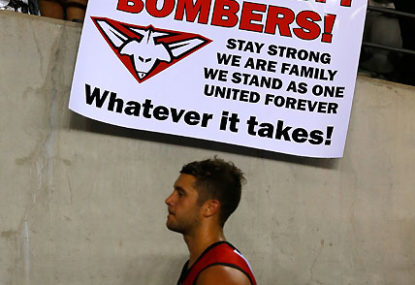AFL News: North OF Melbourne? McGuire's bold idea to rejuvenate Roos, Scott slams sub rule after Anzac Day drama
Eddie McGuire's latest bold idea has dropped - for North Melbourne to take over the outskirts of Melbourne and use it to rejuvenate the…

Thankfully the Essendon Football Club sports supplements saga has come to an end, but it was just another major example of poor governance at a professional sporting club.
The Essendon Football Club is far from alone. In recent years there have been numerous examples of poor governance in Australian sport, particularly by professional sports clubs.
Some of the most significant examples are also amongst the most recent
The Melbourne Storm’s deliberate NRL salary cap breaches over five years resulted in the team winning premierships in 2007 and 2009 and minor premierships in 2006, 2007 and 2008. The Storm were stripped of these two premierships and fined substantially by the NRL. Storm administrators viewed premiership success as critical to having a viable team in their AFL stronghold home city.
The Parramatta Eels have not won a premiership since 1986, but in 2016 they were severely penalised by the NRL for deliberately breaching the salary cap for four years in a desperate bid for glory. You might not agree with salary cap restrictions, but these are rules.
Over the last few years Essendon in the AFL and Cronulla in the NRL have been embroiled in a sports supplements scandal caused by lack of administrative oversight of coaching and support staff. Dr Ziggy Switkowski’s report found significant failings in governance by Essendon’s management and coaches.
The final example of poor governance I want to raise is the issue of managing poor athlete behaviour. There have been numerous cases of athletes being given too many chances or management not willing to make hard decisions at the onset of poor behaviour.
The Canberra Raiders, for instance, gave Todd Carney too many chances before terminating his contract on behaviour grounds. Carney’s subsequent stints at the Sydney Roosters and Cronulla Sharks ended in contract terminations. At the time Carney was viewed by the Raiders as a player too important to their success to have his contract terminated. The lack of early action most likely resulted in many supporters losing interest in the club and possibly in poor on-field performances.
So what is behind this poor governance? It is the tunnel vision on the part of officials that has them conclude that winning is everything – and the reality is that there is nearly always only one winner in a competition unless dead heats are allowed.
‘Star’ athletes are regarded as critical to success, but a club built around a star athlete is setting itself up for failure given serious injury, for example, can strike any player, star or otherwise.
Before the Rio Olympics world rowing champion Kim Brennan said that “winning isn’t everything, striving to win is”. Brennan went on to win gold, but she understood that winning was no certainty and that the process of getting to the Olympics was important to her psyche and wellbeing.
This is a philosophy that clubs and sports organisations should heed and promote to their supporters.
The vast majority of supporters want their clubs to win ethically and according to the rules, not just at any cost – we all remember the bad taste that underarm ball left in the mouth of cricket fans worldwide in 1981. Supporters want their clubs and sports organisations to develop elite and well-behaved athletes that will make them proud, and they are sick and tired of their athletes and clubs being harangued in the media for their misdemeanours.
Supporters of the Melbourne Storm, Essendon Bombers, Cronulla Sharks and Parramatta Eels have paid a heavy price in recent years for poor governance. Clubs seem to forget that supporters invest money and emotion into their teams over many years, and administrators would do well remember that those supporters are in it for the long haul when they, the coaches and the players are free to come and go.
Some clubs are better than others at developing good governance practices and a healthy team culture. The Sydney Swans have been very successful over the last 20 years and are reported to have a ‘no dickheads’ team policy, and their swift and decisive action over Michael Talia’s cocaine possession charge is evidence of their good management style.
The Australian Olympic Committee did not select Michael Diamond, Nick Kyrgios and Bernard Tomic for the Rio Olympics due to poor behaviour, which possibly denied Australia the chance of winning medals in shooting and tennis. The Australian community strongly supported the decision to prioritise merit over medals.
You support a club because of its history, location, premierships or star athletes. I have supported St Kilda in the AFL and the Raiders in the NRL for many years. Both clubs have been in the spotlight for the wrong reasons, and during these periods my support has definitely waned.
What I look for in a club is that it is well managed, has clear and realistic goals, abides by the rules on and off the field of play, develops athletes into great role models and is honest in its engagement with supporters.
Clubs and organisations must have good governance that will allow them to keep supporters engaged in the good and bad times. Let’s hope clubs and our other sporting bodies have finally learnt from Australia’s recent examples of poor management.